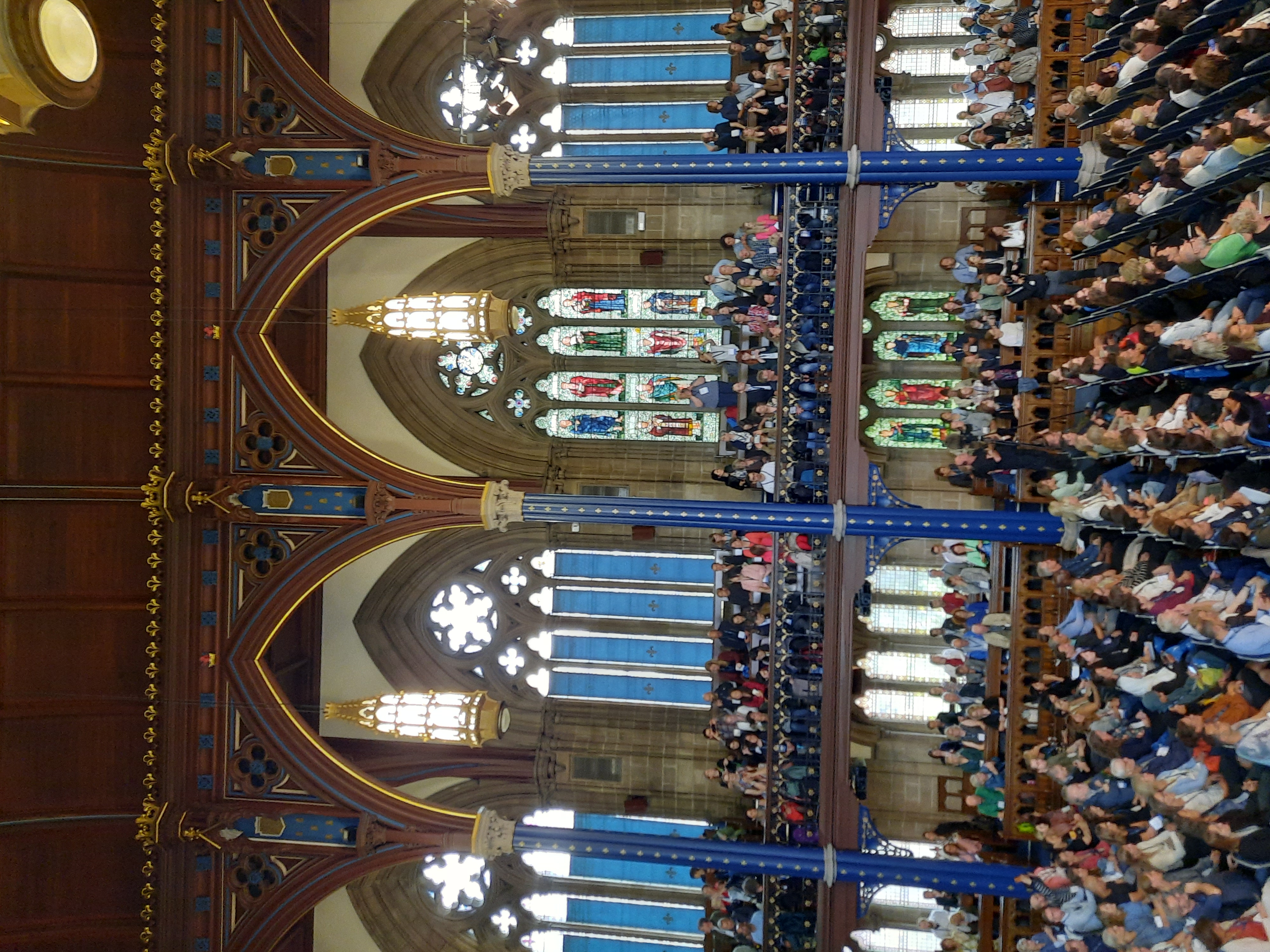FEWL dissemination
Academic Publications
- Harteis, C., Goller, M. & Gerholz, K.-H. (2022). Digitalization of work: Challenges for workplace learning. In L. Cairns, M. Malloch & B. O’Connor (Hrsg.), The SAGE Handbook of Learning and Work (S. 329-341). London: Sage. Read full article.
-
Maria Erss, Krista Loogma & Anna-Liisa Jõgi (2024) The effect of teacher agency support, students’ personal perseverance and work experience on student agency in secondary schools with Estonian and Russian instructional language, Cogent Education, 11:1, 2314515. Read full article.
- Näkk, Anne-Mai and Timoštšuk, Inge, The Relationship between Learning Context and School Burnout at the End of Primary Education. Learning, Culture and Social Interaction. Read full article.
- Näkk, Anne-Mai & Timoštšuk, Inge (2024). Primary School Teachers’ Perspectives on the Relationship Between Students’ Learning and Work-Related Skills. Social Sciences, 13(12), 681. Read full article.
- Nurmik, Kaidi & Timoštšuk, Inge (2024). Integrating Work-Life and Student Work-Related Experiences in Classroom Learning—The Perspective of Primary Teachers). Social Sciences, 12(2), 649. Read full article.
-
Uppin, Helene ja Timoštšuk, Inge (2024). "Eks me oleme kõik natuke idealistid." Muuseumite ja keskkonnahariduse õppeprogrammide juhendajad. ["‘We are all slightly idealistic": The on-site educators of museums, science centres, and other similar institutions]. Mäetagused 88(1), 53-94. Read full article in Estonian. (See the abstract in English at the end of the article).
-
Loogma, Krista, Peterson, Birgit & Aasa, Maret (2024). Conceptualising the Learning of General Upper Secondary Students at Work. Social Sciences, 13(12), 686. Read full article.
-
Uppin, Helene & Timoštšuk, Inge (2024). They Were Surprised That Such Jobs Even Exist…’ Supporting Students’ Career Awareness During Learning Activities at Museums and Environmental Education Centres. Social Sciences, 13(12), 696. Read full article.
-
Erss, Maria & Loogma, Krista (2025). Upper Secondary Students' Learning at Work: The Effect on Agency in School). Social Sciences, 14(1), 17. Read full article.
-
Peterson, Birgit, Krista Loogma, and Maret Aasa (2025). Practices in Integrating Workplace Learning into Upper Secondary Education. Social Sciences 14(48). Loe artiklit.
-
Schwede, J., Heisler, D., & Harteis, C. (2025). Integrating Practice-Based Learning into Formal Education: Stakeholder Perspectives on the Challenges of Learning Location Cooperation (LLC) in Germany’s Dual VET System. Social Sciences, 14(3), 117. Read full article.
-
Kärkkäinen, K., Virolaianen, M., Virtanen, A. & Tynjälä, P. (2025). Work-Based Learning in Migrant Education: The Case of Finnish Vocational Education. Social Sciences, 14(5), 275. Read full article.
ECER conference in Belgrade
From September 9th-12th 2025, Maria Erss and Krista Loogma from the Estonian FEWL project team participated in the European Conference of Educational Research (ECER), which took place in Belgrade, Serbia - a city with a fascinating, although complicated history and a meeting point of different cultures. They presented their paper, "Growing the Agency of Upper Secondary School Students through Work Experience" in the curriculum innovation network. The paper was part of the symposium "Exploring a children's rights perspective to agency in curriculum making" which united different perspectives on children's agency from three countries: UK ( presenters Andrea Priestley and Brian Johnston from the University of Stirling), Ireland (presenter John O'Reilly) and Estonia (Maria Erss and Krista Loogma). The discussant of the symposium was Professor Äli Leijen from the University of Tartu, who wrapped up the session with insightful thoughts.
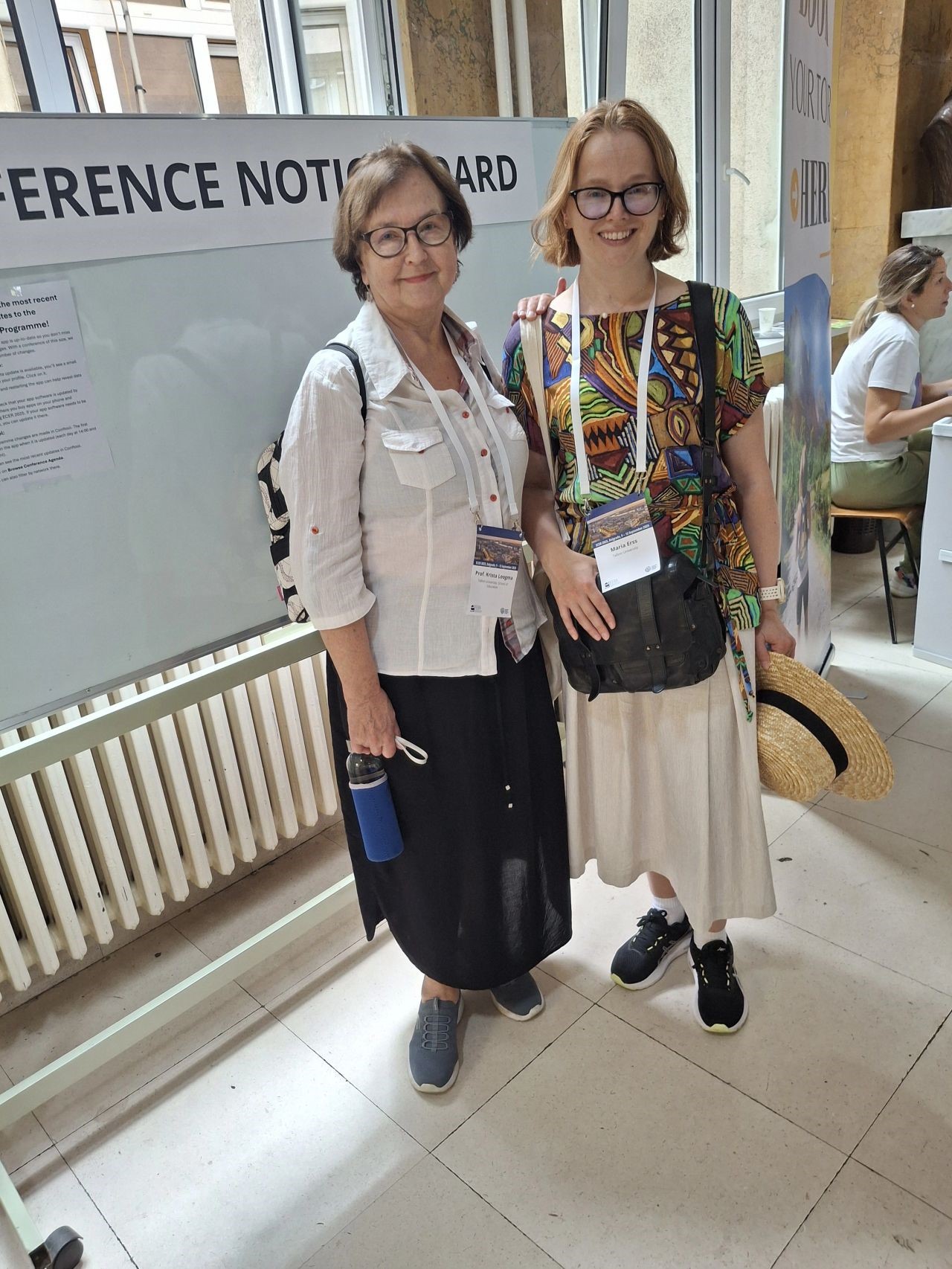
WERA Focal Meeting 2025 from October 26-30 in João Pessoa, Brazil
Christian Harteis presented in October 2025 his research on “The digitalization of work and its effects on formal and informal learning for work” at the WERA Focal Meeting in João Pessoa in Brazil.
FEWL Conference "The World of Work in School – Opportunities and Contradictions" in Tallinn University 25.04.2025
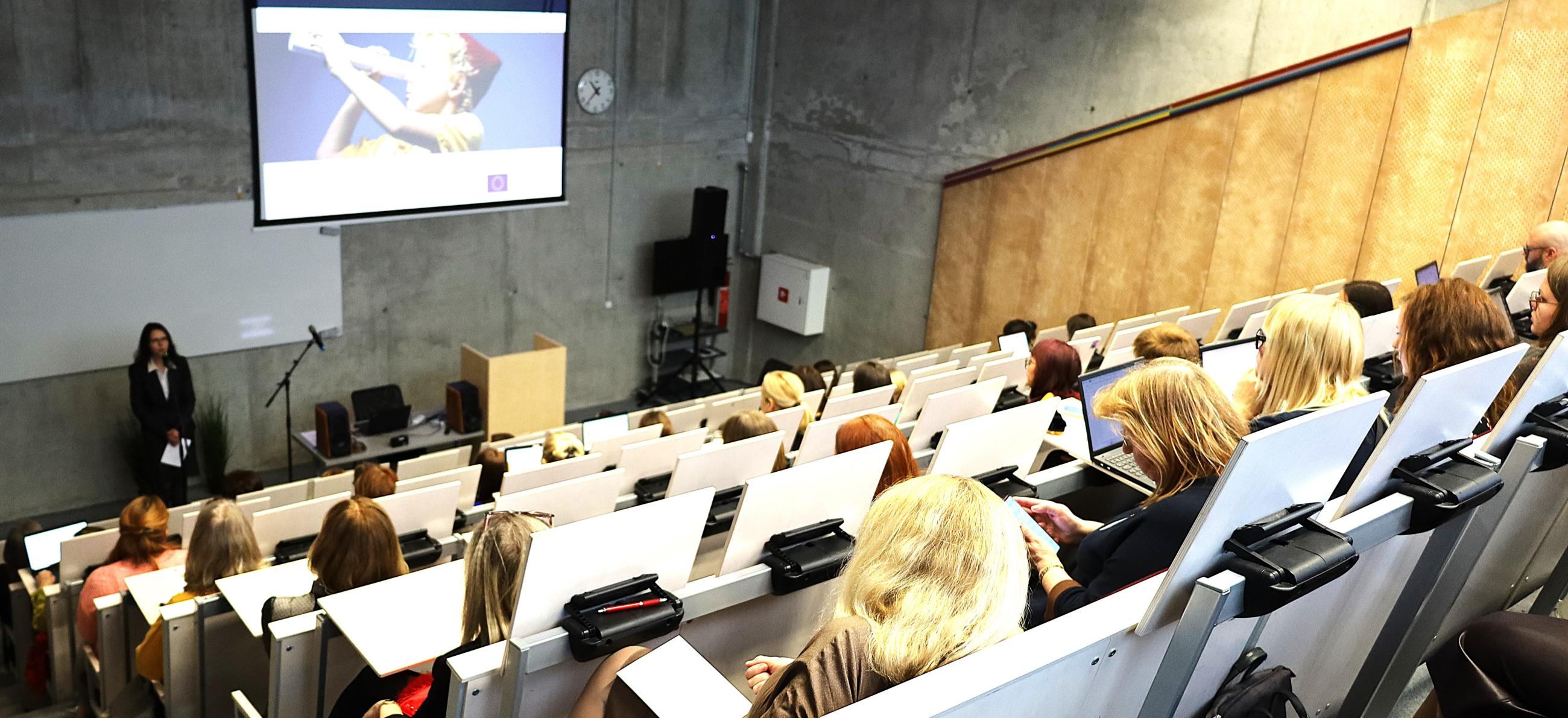
Photo: Opening speech by Tiia Õun, Director of the School of Educational Sciences at Tallinn University / Photo by: Tallinn University
Children and Work: “Students were surprised that such jobs even exist!”
On April 25, education researchers, policymakers, and employers gathered at Tallinn University to discuss the connections between children’s and young people's learning and work, and the possibilities for integrating the world of work with school education. The conference “The World of Work in School – Opportunities and Contradictions” presented the findings of the two-year project “Enhancing Research on the Integration of Formal Education Programmes and Workplace Learning” (FEWL) and their application in both working life and education.
The discussions focused on the collaboration between schools and enterprises in integrating children and young people into working life, the links between extracurricular activities and work, and the impact of work experience on students’ initiative and agency. The conference also highlighted the untapped potential of museum education in helping students understand the world of work. “The children who came on the field trip were surprised that such professions even exist!” said one museum employee, emphasizing the importance of connecting children to the “real world.”
Work Life Should Be Introduced Already in School
In Estonia, more and more students are working alongside school or during holidays. “According to our study, as many as 80% of upper secondary students have done some kind of paid work. Among lower secondary students, over half — 52.7% — have had work experience,” noted Maria Erss, Associate Professor of Curriculum Theory at Tallinn University.
However, employers report that young people taking their first steps into the job market often have unrealistic expectations, and that schools don’t talk enough about working life. Schools should help students identify their career possibilities, interests, and ambitions early on. Getting to know the world of work could start much earlier — already in primary school.
Students, on the other hand, don’t perceive that teachers bring real-life examples into their lessons. “The world of work is not a comfortable topic for teachers, partly because parents often have conflicting expectations,” explained Professor Inge Timoštšuk from Tallinn University in the opening speech of the conference.
Schools clearly play a key role in developing competencies that help young people cope not only academically and in everyday life, but also in working life. Although many schools describe practices that introduce students to working life, the study shows that such integration is mostly incidental and largely depends on individual teachers’ views and attitudes, as well as the overall organization of the school.
Professor Timoštšuk emphasized that both children and teachers need the support of parents and employers in understanding the nature of both volunteer and paid work — including concrete examples of good practices. “Employers have high expectations for young people’s general skills but are often reluctant to invest in developing those skills,” she noted.
The World of Work Is Part of Children’s Lives
Professor Timoštšuk stressed that work is a natural part of children’s lives — many skills used in play, learning, and work overlap. “Common elements include goal orientation, attention and focus, problem-solving, social interaction, cooperation, and communication. Empathy, understanding roles, self-regulation, persistence, emotional control, time management, and determination are also crucial.”
The key difference between these activities is the goal. “The goal of work is to produce results or value while in learning, the goal is to acquire knowledge or skills; in play, it is to achieve or experience something within a framework of rules,” the professor explained.
For young people, a key motivator to start working is often financial independence. Researchers were also interested in how working affects young people’s agency. “Agency is a person’s capacity to take control of their life, set goals, make choices and deliberate decisions, and solve problems,” said Erss. “It also includes the ability to make one's voice heard and to express opinions, as well as the courage to stand up against perceived injustice.”
Agency is not an inborn trait. “It develops through the combination of personal effort and the opportunities and constraints of social structures,” Erss explained. The most important factors supporting student agency are persistence, but also teacher support and work experience — and to a lesser extent, gender, age, school culture (especially related to schools serving Estonian or Russian speaking students), and the student’s socio-economic background.
How to Prepare Young People for Working Life?
Students encounter the world of work in various ways — through observing their parents’ work, participating in family tasks, or through community initiatives. Earning their own pocket money gives them an even more personal experience.
Krista Loogma, a long-time professor of vocational education at Tallinn University, noted that many students get their first and often quite responsible work experiences at home. “This was especially evident among rural youth, who reported a wide range of work experiences — forestry, repair work, farm work, and household tasks.”
She gave an example of a child from a large family who spoke of the life lessons learned through home responsibilities. “He mentioned that simple things like a warm room don’t come by themselves. It takes a lot of work to warm the room — starting from cutting down trees in the forest.”
Young people find their way into “real” jobs in different ways — through personal contacts, volunteer work, school programs, youth brigades, or short-term "work bites". First work experiences can lead to continuous employment in a company. Balancing regular work with school is challenging, and many young people who enter the workforce feel unsupported. “They often described being ‘thrown in the deep end’ and having to manage on their own,” Loogma observed.
Two Separate Worlds
The biggest bottleneck in getting young people into working life is the lack of collaboration between schools and employers. “Although there are good examples of how what is learned at work can be applied in school, the two worlds largely remain separate,” said Loogma. According to her, schools are generally more active in seeking contact. “Although the topic is highly relevant to employers, there is little willingness from their side to contribute.”
To strengthen cooperation, open dialogue and the exchange of ideas are needed to develop new models and opportunities for collaboration. It's important to organize joint meetings and find suitable ways to make cooperation regular and consistent.
See also:
-
Postimees article on the same topic: "Study: students' expectations of jobs are often unrealistic."Uuring: õpilaste ootused töökohtadele ei ole sageli realistlikud")
-
Novaator story: "Inge Timoštšuk and Kaidi Nurmik: Work builds a bridge between classroom learning and real life." "Inge Timoštšuk ja Kaidi Nurmik: töö loob silla tunnis õpitava ja päriselu vahel"
International Sociolinguistic Conference on Migration in Sestri Levante, Italy in June 2025
Katarzyna Kärkkäinen and her colleagues Päivi Tynjälä, E. Pitkäranta, Anne Virtanen and Maarit Virolainen from the University of Jyväskylä participated in June 2025 in the International Sociolinguistic Conference on Migration SLIMIG where they presente their research, “Applying arts-based approaches in the study on migrant students’ learning in workplaces.”
Sino-German VET Conference in Shanghai, China, in October 2025
In October 2025, Jana Schwede from the University of Paderborn presented her research “Integrating practice-based learning into formal education: Stakeholder perspectives on the challenges of learning location cooperation in Germany’s dual VET system” at the Sino- German VET Conference in Shanghai, China.
AERA Annual Meeting in Denver, USA in April 2025
Jana Schwede, a doctoral student from the University of Paderborn and her supervisor, Christian Harteis, participated in April 2025 in the American Educational Research Association’s (AERA) annual conference in Denver, where they presented a paper, “Dynamics of learning location cooperation (LLC) in VET: Exploring stakeholders' approaches, experiences, and perspectives” in a roundtable.
EARLI conference in Graz, in August 2025
Jana Schwede and Christian Harteis from the University of Paderborn participated in August 2025 in the EARLI conference in Graz where they presented a paper, “Exploring challenges in Germany’s VET system: Stakeholder insights on learning location cooperation (LLC).“ The same conference was also attended by researchers from Tallinn University, Maile Käsper, Inge Timoštšuk and Anne-Mai Näkk, who introduced their paper “Student teachers’ professional learning experience.“
Hochschultage Berufliche Bildung, Paderborn 2025
In March 2025, Jana Schwede, Dietmar Heisler and Christian Harteis from the University of Paderborn participated in the seminar about vocational education at the University of Paderborn, where they held a poster presentation about the FEWL project “Enhancing research on the integration of formal educational programmes and workplace learning.”
Pedaforum conference 2025 in Espoo
Anne Virtanen and Päivi Tynjälä participated in June 2025 in the Pedaforum conference in Espoo, Finland, where they presented their research, “Assessment of work-related learning in Higher Education. A scoping review.”
EARLI conference “Walking the talk: Co-constructing the politics of meaning, diversity and learning” 11.-13.09.2024.
-
From September 11 to 13, 2024 an EARLI conference, “Walking the talk: co-constructing the politics of meaning, diversity and learning,” organized by SIG10, 21 and 25 took place at the University of Bari in Italy. Maria Erss, Inge Timoštšuk and her doctoral students Kaidi Nurmik and Helene Uppin participated in the conference from the FEWL team.
Maria Erss, presented a co-autored paper with Krista Loogma titled "Upper Secondary School Students'; Learning at Work: The Effect on Agency in School". Data collected as part of the 2022 Tallinn University Student Survey revealed that students with higher agency perceived greater teacher support, had higher perseverance, achieved good grades in history, and had acquired various specific skills while working. Additionally, boys and native Estonian speakers exhibited higher levels of agency compared to girls and students whose native language was Russian or another language.
Kaidi Nurmik presented a co-authored paper with Inge Timoštšuk titled " Learning Context Factors Shaping Learner Agency – An Ecological Perspective." Interviews with classroom teachers revealed that while teachers do involve people from outside the school to enrich their teaching, overcrowded curricula and a shortage of resources, including for inclusive education, hinder the creation of a broader learning environment. When planning lessons, teachers consider their students’ specific characteristics and needs, but learners are relatively little involved in shaping their own learning experiences. Although the interviews revealed several examples of teachers giving students opportunities to make suggestions and direct their learning based on their personal interests and goals, such examples were rather rare. The study results suggest that learners' agency in the learning process is generally limited.
Helene Uppin’s and Inge Timoštšuk's presentation, "Museum and Science Centre Educators’ Perceptions of Addressing Students’ Career Awareness" revealed that although museums and science centres offer students opportunities to explore various professions and try out different roles, cooperation between schools and cultural institutions outside of school is not sufficiently meaningful and personal. Many teachers do not utilize or sufficiently value out-of-school learning opportunities. Cooperation is overly dependent on project-based funding, the availability of marketing materials, and the national curriculum guidelines.
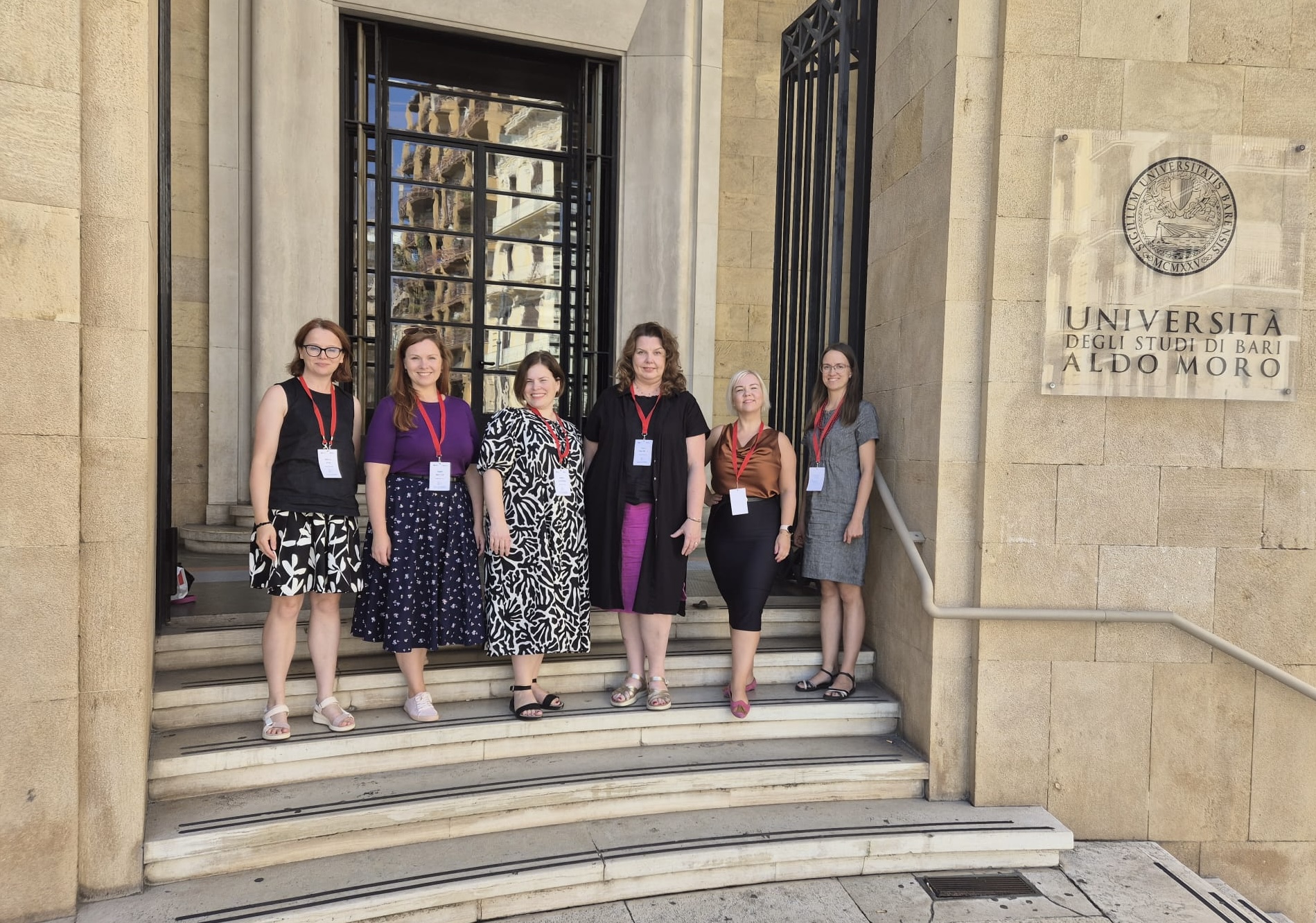
In the picture: Professor Maria Erss, FEWL project leader Inge Timoštšuk, and doctoral students Kaidi Nurmik, Maiki Vanahans, Heddi Reinsalu, and Helene Uppin.
EARLI SIG14 Conference in Jyväskylä 19-23.08.2024
- The FEWL project team participated in the EARLI SIG14 conference at the University of Jyväskylä from August 19–23, 2024, where an invited symposium on the integration of workplace learning and formal education research was conducted. The symposium was led by the FEWL project leader Inge Timoštšuk from Tallinn University who also gave a presentation.
In the symposium, the FEWL project leader Inge Timoštšuk and doctoral student Birgit Peterson from Tallinn University presented their research; Päivi Tynjälä from the University of Jyväskylä and Christian Harteis from the University of Paderborn also participated. The presentations at the symposium were reflected upon by Professor Stephen Billett from Griffith University in Australia who was in the role of a discussant. In her presentation, Inge spoke about the possibilities of linking the world of work with primary education, and Birgit focused on the work experiences of high school students, what aspects they find meaningful in workplace learning, and the connections they see between learning at school and at the workplace. Päivi introduced her integrative pedagogy model, created 25 years ago, and its recent developments for integrating what is learned in (vocational) school and in work practice. Christian discussed the difficulties in connecting theory and practice in the context of the German dual vocational education system.
Later, Tallinn University doctoral student Kaidi Nurmik, along with Inge Timoštšuk, presented the perspectives of class teachers on how to bring the world of work closer to primary school children. Kaidi investigated in her interviews with 20 primary school teachers how teachers integrate work life with learning in the classroom and what limitations they perceive in it. She found that teachers often connect learning content with the occupations of parents to provide real-life examples of where school knowledge is applicable. However, the potential of local community members and institutions, such as local businesses, is frequently underutilized. The findings indicated that the integration of work-related elements largely depends on individual teachers'; attitudes and they often perceive work-related experiences as basic tasks, such as maintaining order.
Tallinn University doctoral student Helene Uppin presented, in a joint presentation with Inge Timoštšuk, a study on the activities of museum and environmental education center employees in supporting the career awareness of young people. Helene introduced the preliminary findings concerning a small-scale study into how educators of Estonian museums and centres of environmental education support the development of students’ career awareness. Learning activities at museums and centers of environmental education contain activities that are related to work-life and potentially support career awareness. For example, different professions and related educational paths are introduced, work-specific skills are practiced, historical and modern professions are compared, famous role-models and their life paths are analysed. Although self-awareness is considered a part of career awareness in literature, our on-site educators sometimes fail to connect it to career awareness. It seems that a longer working experience and pedagogical training tend to predict a wider or more holistic look on students’ career awareness and life- long learning.
PhD student Birgit Peterson from Tallinn University focused on practices for integrating workplace learning and school education at the high school level. Her research explores, on one hand, different integration practices, and on the other, the experiences, expectations, and needs of employers in this context. Recently, Estonian schools and employers have been developing various forms of collaboration to combine school education with workplace learning to enhance young people's general competencies. The aim of this study was to investigate the pedagogical methods used by Estonian general education schools to integrate school education and workplace learning within the context of developing general competencies. The study employed individual and focus group interviews with high school teachers, academic leaders, and employers. The findings revealed that workplace learning (e.g., short-term internships, voluntary work) is primarily integrated into general education to develop general and career-related competencies. Both schools and employers consider the reflection and conceptualization of experiences as an important part of the learning process. In practice, this integration is implemented through institutional cooperation in elective courses or as part of school exams. Addressing work-related topics or reflecting on work experiences in mandatory subject classes is rare in school practice.
Stephan Drechsler, a PhD student from Paderborn University, discussed in his roundtable session "What is an AI-literate Researcher?, a comparative Delphi study on researchers"; AI literacy across mathematical, biological, and educational sciences, highlighting the need for AI-literate researchers and the potential for developing AI literacy programs to enhance research processes. The study investigates how AI literacy is defined among researchers and what competencies are necessary for researchers in mathematical sciences, biological sciences, and educational sciences to ethically and effectively integrate AI into research processes. The study aims to develop a comprehensive model of an AI-literate researcher (AILR) by collecting expert opinions through multiple rounds of structured questions and feedback. The findings will contribute to developing instruments to measure AIL among researchers, educational curricula, and further education programs, ensuring ethical, effective, and reliable use of AI in research. More information about the project is available
here.
Jana Schwede, a PhD student from Paderborn University, presented her research “Unveiling the Dynamics of Learning Location Cooperation in VET: An In-Depth Exploration of Stakeholders’ Perspectives, Experiences, and Approaches” with a focus on Germany's dual VET system. The qualitative interview study involving VET teachers, company trainers, inter-company trainers, and apprentices revealed diverse barriers to cooperation from the different stakeholders'; viewpoints while providing actionable recommendations to enhance cooperation practices. The study ascertained that teachers and trainers see cooperation between different learning locations as important but regard extensive cooperation beyond organizational matters as unattainable due to constrained time resources prioritizing other tasks. Apprentices were mostly satisfied with how they experienced LLC, but some expressed frustration about repetitive learning content between schools and inter-company training centres. Participants also made suggestions on how to improve current cooperation practices, which involved establishing personal informal networks and building a deeper understanding of the organizational structures within each other's learning locations.
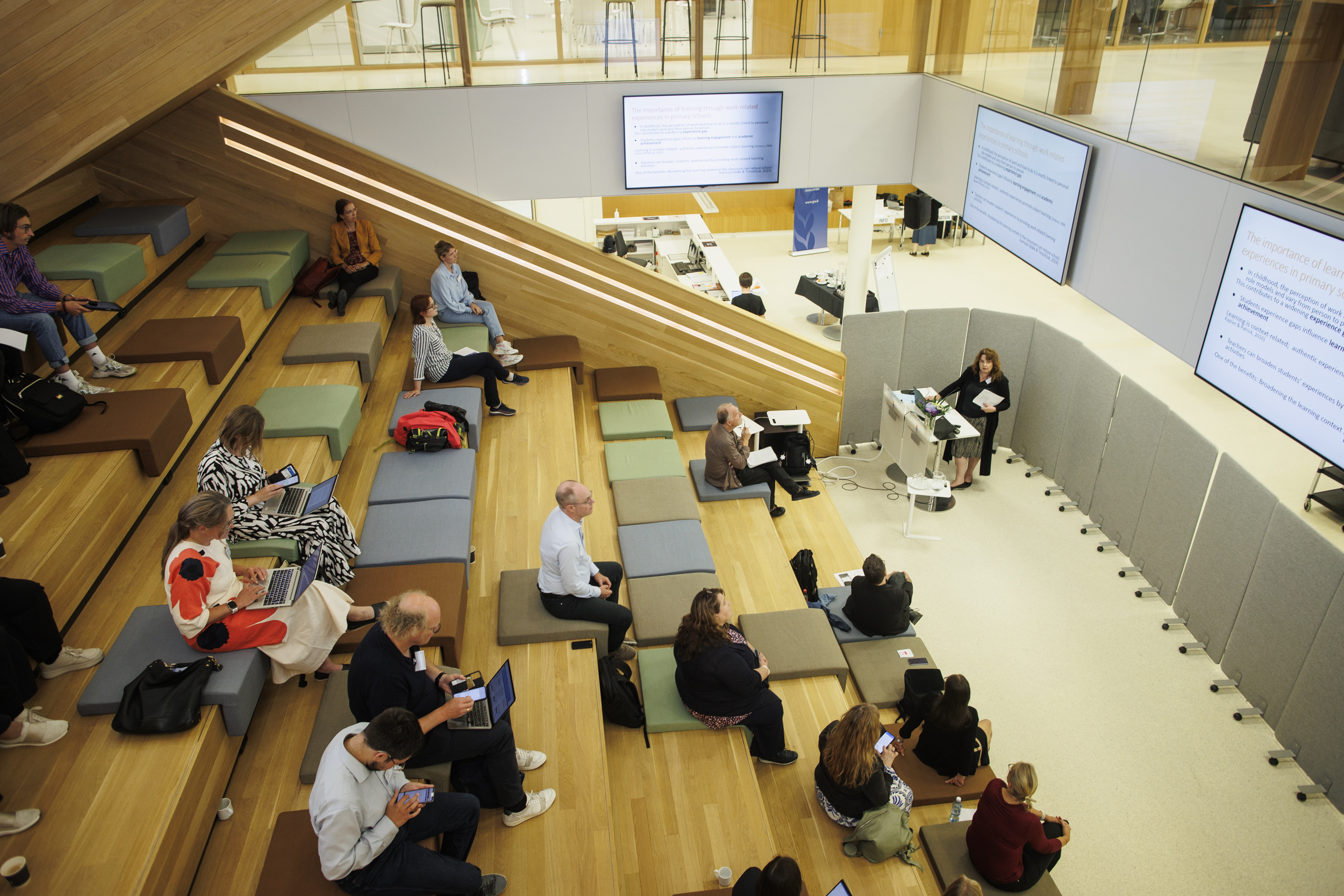
Conference of Education ECER in Glasgow 22.08.2024
- Maria Erss presented her research titled "Student agency as cultural and gender phenomenon: The role of teacher support and work experience in predicting agency" on August 22nd at Europe's largest education conference ECER in Glasgow.
The presentation was part of a symposium on the agency of children and young people which had participants also from Germany and the UK. The research of Maria Erss revealed that teacher support and previous work experience of students are positively correlated with student agency. Further, student agency is influenced by school culture and gender. Students from schools with Estonian instructional language and boys expressed higher levels of agency and rated the support of teachers to their agency higher than students from schools with Russian instructional language and girls. In order for the youth to have the courage and will to be proactive and make independent decisions in school, students' choices and the freedom to express their opinions and make suggestions have to be supported. The self-confidence that is attributed to agency can also be increased by work experience. Therefore, opportunities must be offered for the youth to gain work experience.
|
MARIA ERSS AT THE ECER 2023 CONFERENCE IN GLASGOW. SUPPORTING LEARNERS' AGENCY IN VARIOUS LEARNING ENVIRONMENTS, INCLUDING WORKPLACE LEARNING, IS A KEY FOCUS OF THE FEWL PROJECT.IN THE FIRST PICTURE, MARK PRIESTLEY, ANDREA PRIESTLEY, AND MARIA ERSS. IN THE SECOND PHOTO, THE GREAT HALL OF THE UNIVERSITY OF GLASGOW, WHICH IS ALLEGEDLY THE INSPIRATION FOR THE GREAT HALL OF HOGWARTS IN J.K. ROWLING'S 'HARRY POTTER' SERIES." |
EARLI Conference Presentation “Integration of everyday life aspects in classroom learning” in Greece 22.08.2023
-
Anne-Mai Näkk, an early-stage researcher from the FEWL project’s Estonian team, presented on August 22nd 2023 the joint presentation with Inge Timoštšuk titled “Integration of everyday life aspects in classroom learning” at the EARLI conference in Thessaloniki, Greece.
She presented her research where last year primary school students (N=966) who are being taught by primary teachers and subject teachers were asked to what extent their teachers integrate everyday life aspects (such as practical usefulness, importance, value) in classroom learning. The cluster analysis revealed four profiles including Integrators (20.6%), Explainers (29.2%), Subject-oriented (17.6%), and Inconsistent (32.6%) profile. The results indicate the need to emphasise the value of balancing personal contexts and curriculum in classroom teaching practices to support students’ meaningful learning.
International Conference in Spain in March 2023 - Presentation “Supporting primary students’ agency at school through life-world experiences”
-
Kaidi Nurmik, an early stage researcher of the FEWL project’s Estonian team, and her supervisor, professor Inge Timoštšuk, participated in March 2023 in the 17th International Technology, Education and Development Conference in Valencia, Spain, where they presented their paper “Supporting primary students’ agency at school through life-world experiences.”
Since involving students´ life-worlds such as personal interests, hobbies, after-school activities, and parents' professional lives and interests in the learning process could support the development of agency, their aim was to understand how primary teachers have involved students’ life-worlds in the learning process and what impact they have noticed on the students' learning. Semi-structured interviews with 11 primary school teachers indicated that teachers have involved students' life-world experiences for the purpose of enriching school life and supporting relations with broader social context through examples of new and exciting activities. Although enriching the learning content is not the focus, it could be concluded that by implementing life-world activities, teachers have recognised the possibility of supporting student agency.
|
|
FEWL in the Media
- "Is it necessary to learn how to work?" The FEWL project researchers Maria Erss and Krista Loogma were on 5th of July invited guests on the radio program "Huvitaja" in Vikerraadio where they talked about questions such as whether working is a skill that needs to be learned, what young people get from working alongside school and whether the curricula of general education schools should involve some kind of work experience. The interview in Estonian is accessible here.
- Maria Erss discussed on January 31st in the Tallinn University talk show "Expert on air" among other topics student agency and its relationship with work experience which is also the focus of the project "Enhancing research on formal educational programmes and workplace learning". Watch the recording in Postimees TV here. More detailed discussion of the relationship between student agency and work experience will be available in the soon to be published research article of Maria Erss, Krista Loogma, and Anna-Liisa Jõgi (2024) "The effect of teacher agency support, students’ personal perseverance and work experience on student agency in secondary schools with Estonian and Russian instructional language". Cogent Education. DOI - 10.1080/2331186X.2024.2314515
- "Inge Timoštšuk and Kaidi Nurmik: work creates a bridge between classroom learning and real-life" ("Inge Timoštšuk ja Kaidi Nurmik: töö loob silla tunnis õpitava ja päriselu vahel"). Novaator, February 6th, 2025. In this opinion article, Inge Timoštšuk and Kaidi Nurmik talk about the importance of explaining the nature of work and developing practical work skills already in primary school. Read full article.
-
“Is early work experience making young people bolder and more self-confident?”, Estonian Teachers’ Newspaper, 10.02.2023 ("Kas varane töökogemus teeb noored julgemaks ja iseteadvamaks? Eesti ja vene noorte võrdlus." Õpetajate Leht, 10.02.2023) Author: Maria Erss.
This article summarizes the research of Maria Erss on the relationship between work experience and student agency in secondary schools with Estonian and Russian instructional language. The author ascertained that these students who work during school breaks in paid jobs, youth work camps, as volunteers, or in other ways are also reporting more agentic engagement in the classroom and have more courage to express their opinions or stand up against perceived injustice at school. Read the article in Estonian.
-
“The gap of skills and experiences” ("Oskuste ja kogemuste lõhe"), Maria Erss and Krista Loogma in the Vikerraadio talk show „Huvitaja“, 08.02.2024.
Maria Erss and professor Krista Loogma introduced the Twinning project of Tallinn University, “Enhancing Research on the Integration of Formal Educational Programmes and Workplace Learning” (FEWL) which deals with the question of how to reduce the gap of skills and experiences in order to achieve a better match between knowledge and skills learned at school and needed in real work life. They also discussed how to ensure that everybody has equal opportunities and access to knowledge. Listen to the radio programme.
-
“About the need of uniting work experience and general education: Examples from the practice of teachers and schools” by Maria Erss in Teachers’ Newspaper, 13.02.2024 ("Töökogemuse ja üldhariduse ühildamise vajadusest: näiteid õpetajate ja koolide praktikast." Õpetajate Leht 13.02.2024),
How could schools and teachers help to reduce and prevent the existing and future gaps of work experience? Formal education does not often keep up with the rapid changes in the economy and society, which makes learning outside of school, at the workplace, in extracurricular activities, museums and other cultural and memory sites even more important. Learning also happens through real or virtual contacts with knowledgeable and skilled people or by self-education. The educational researchers of Tallinn University, Inge Timoštšuk, Krista Loogma, Triin Roosalu and Maria Erss, are currently researching within the European Twinning project FEWL how to better integrate school education and workplace learning. Read the article in Estonian.
Repository for FEWL Documents
The first collaborative publication of the FEWL team gives an overview of the current state of the art of research on integrating school-based and work-based learning. The working paper focuses on theories, terminology, methodologies, the personal and social impact of workplace learning, and the contexts in which learning occurs. Furthermore, some practices on how to integrate work-related learning into formal education and their influence on student agency are introduced.
-
The second collaborative working paper of the FEWL team helps to understand and make visible how members of the “Enhancing Research on the Integration of Formal Educational Programmes and Workplace Learning” project team understand personal and institutional factors and mechanisms influencing the integration of school learning and workplace learning (WPL) for agency development. Relevant theoretical reviews and the reviews of empirical studies that have just been completed or are currently underway as part of the science work package have been summarised. Relevant studies of project members on the integration of work and formal education are presented.

